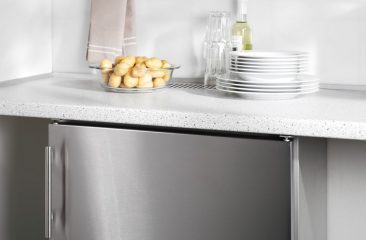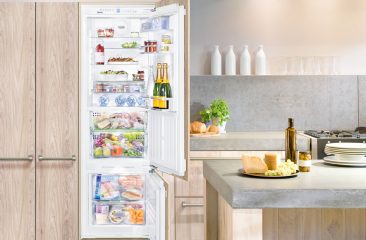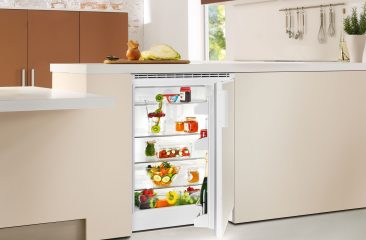A kitchen isn’t a kitchen without a refrigerator, but where is the best place to position one and what else should you consider when designing your kitchen? Below we’ve listed five points relating to energy efficiency, convenience, and ergonomics, which you should bear in mind.
- Never place the refrigerator directly next to a heat source, such as an oven or radiator. Constant heat radiation can reduce the refrigerator’s energy efficiency and shorten its service life because it has to run more often.
- Plan an area for setting food down/preparing it next to the refrigerator. This keeps distances short and means you can close the refrigerator door as soon as you have taken out the food you plan to use. It also provides a useful space for setting food down when putting away your shopping.

It makes sense: incorporate an area for setting food down and preparing it.
- A refrigerator needs sufficient space for proper ventilation, both above it and below. Without adequate ventilation, warm air accumulates and the compressor runs continuously, which impairs the appliance’s service life. When planning your kitchen, we recommend you include a ventilation space of at least 200 cm². Essentially, the greater the ventilation space, the greater the energy efficiency of the appliance.

Important: ensure there is adequate ventilation
- Think about the ergonomics. For example, we recommend that you install appliances of height 122 cm or less above floor level to prevent you having to bend down constantly.

- Ensure your refrigerator is large enough for your household and has all the temperature zones you need (BioFresh compartment). When buying a new refrigerator, think about your eating habits (e.g. do you eat lots of fruit and vegetables?) and the number of people in your household.
Refrigerator capacity: general rule of thumb
Households with one or two people: Net capacity of about 70 to 100 liters is required.
Households with three or more people: add another 40 to 50 liters for each extra person.
Freezer capacity: general rule of thumb
If you store small to medium amounts of frozen food, a net capacity of about 50 to 80 liters will suffice. For large amounts of frozen food for longer periods, plan for about 130 liters per person.
For all your questions about which appliance is right for you, we will gladly help by offering you advice.
Do you have any questions or comments about this post? Please write to us and tell us about them! Use the comment function below this post or start/join in discussions with us on Facebook.
Author: Daniel Glanz